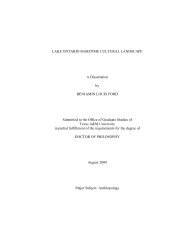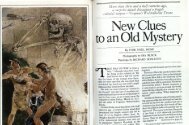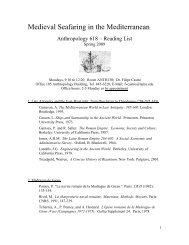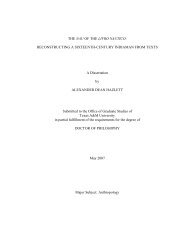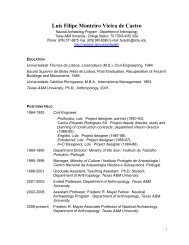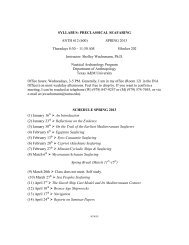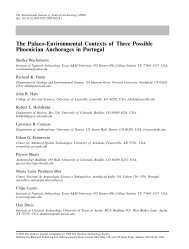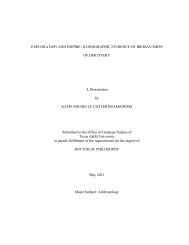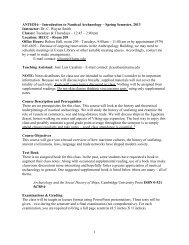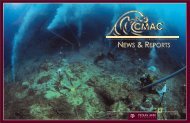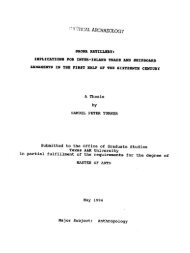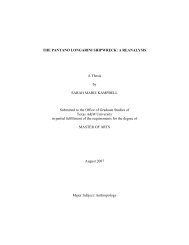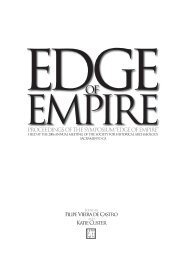Download Pdf of Dissertation - Nautical Archaeology at Texas A&M ...
Download Pdf of Dissertation - Nautical Archaeology at Texas A&M ...
Download Pdf of Dissertation - Nautical Archaeology at Texas A&M ...
You also want an ePaper? Increase the reach of your titles
YUMPU automatically turns print PDFs into web optimized ePapers that Google loves.
the territory <strong>of</strong> Thuria. And when they came to the river Hylias and the Crotoni<strong>at</strong>es sent<br />
word to them th<strong>at</strong> their army could not go through their territory with their consent, they<br />
went down and bivouacked near the sea <strong>at</strong> the mouth <strong>of</strong> the Hylias; and their ships met<br />
them <strong>at</strong> th<strong>at</strong> point. On the next day they embarked their army and proceeded along the<br />
coast, touching <strong>at</strong> the various cities, with the exception <strong>of</strong> Locri, until they reached Petra in<br />
the territory <strong>of</strong> Rhegium. (C. Forster Smith).<br />
329<br />
Thuc. 7.25.2-3: kai; xuvla nauphghvsima ejn th`/ Kaulwniavtidi k<strong>at</strong>evkausan,<br />
a} toi`" jAqhnaivoi" ejtoi`ma h\n. e[" te Lokrou;" meta; tau`ta h\lqon, kai; ojrmousw`n<br />
aujtw`n k<strong>at</strong>evpleuse miva tw`n ojlkavdwn tw`n ajpo; Peloponnhvsou a[gousa Qespiw`n<br />
ojplivta".<br />
And they (the Spartans) also burned some timber in the territory <strong>of</strong> Caulonia which<br />
was lying there ready for the Athenians to use in ship-building. After this they went to<br />
Locri, and while they were lying there <strong>at</strong> anchor, one <strong>of</strong> the merchant-ships th<strong>at</strong> had sailed<br />
from the Peloponnesus arrived in port, bringing some Thespian hoplites.<br />
(C. Forster Smith).<br />
Thuc. 8.35.1: jEk de; th`" Peloponnhvsou tou` aujtou` ceimw`no" jIppokravth"<br />
oj Lakedaimovnio" ejkpleuvsa" devka me;n Qourivai" nausivn...<br />
During the same winter Hippocr<strong>at</strong>es the Lacedaemonian sailed from the<br />
Peloponnesus with ten Thurian ships… (C. Forster Smith).<br />
Thuc. 8.91.2: a{ma ga;r kai; ejk th`" Peloponnhvsou ejtuvgcanon Eujboevwn<br />
ejpikaloumevnwn k<strong>at</strong>a; to;n aujto;n crovnon tou`ton duvo kai; tessaravkonta nhè",<br />
w\n h\san kai; ejk Tavranto" kai; ejk Lokrw`n jItaliwvtide" kai; Sikeliaiv tine", ojpmou`s<br />
ai h[dh ejpi; La/` th`" Lakwnihh`"...<br />
For <strong>at</strong> this very time it so happened th<strong>at</strong>, on the invit<strong>at</strong>ion <strong>of</strong> the Euboeans, ships<br />
from the Peloponnesus to the number <strong>of</strong> forty-two, among which were Italian vessels from<br />
Tarentum and Locri and some from Sicily, were already lying <strong>of</strong>f Las in Laconia. (C.<br />
Forster Smith).<br />
Val. Max. Facta et Dicta Memorabilia 8.7.2: [Pythagoras] in Italiae etiam partem, quae<br />
nunc maior Graecia appellab<strong>at</strong>ur, perrexit, in qua plurimis et opulentissimis urbibus<br />
effectus studiorum suorum adprobavit.<br />
Pythagoras proceeded also in th<strong>at</strong> area <strong>of</strong> Italy, th<strong>at</strong> <strong>at</strong> th<strong>at</strong> time was called Gre<strong>at</strong>er<br />
Greece, in which he proved the good effects <strong>of</strong> his studies in many and rich cities.<br />
(D. Bartoli).<br />
Veg. Mil. 4.39: Quibus mensibus tutius navigetur. Sequitur mensum dierumque tract<strong>at</strong>us.<br />
eque enim integro anno vis <strong>at</strong>que acerbitas maris p<strong>at</strong>itur navigantes, sed quidam menses<br />
aptissimi, quidam dubii, reliqui classibus intractabiles sunt leges n<strong>at</strong>urae. Pachnitae<br />
decurso, id est post ortum Pleiadum, a die VI kal. Iunias usque in Arcturi ortum, id est in<br />
diem VIII decimum kal. Octobres, secura navig<strong>at</strong>io creditur, quia aest<strong>at</strong>is beneficio<br />
ventorum acerbitas mitig<strong>at</strong>ur; post hoc tempus usque in tertium idus ovembres incerta<br />
navig<strong>at</strong>io est et discrimini proprior propterea, quia post idus Septembres oritur Arcturus,



